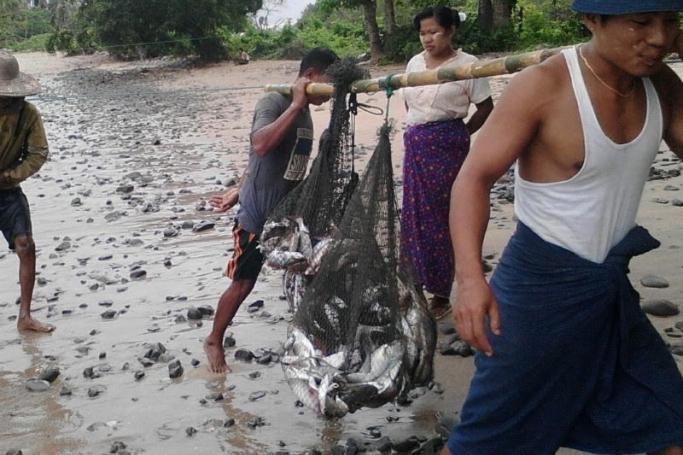Nyo Win’s family relied on his small-scale fishing expeditions for more than 20 years. But now he is considering abandoning the work.
The supply is not what it once was.
Like other local residents of Ngwe Saung Township in Pathein district, the 44-year-old has witnessed a steep decline in daily output.
“In the past, each boat could catch about 300 fish a day. But now, it is hard to get 80 fish a day. On some days, we almost catch no fish,” he said. “So I am now thinking of changing to another livelihood as fishing is not a reliable business for our family.
Rampant overfishing and a lack of rules and regulations are the underlying cause. The use of poison, electric shock, explosives and dragnets, while successfully outlawed in other areas, continues in Ngwe Saung, said San Win, an official with the township’s Department of Fisheries.
“The use of dragnets is the most serious cause for the decline of the fish population,” he said. “This fishnet roots out all small plants for fish food resources, damaging fish habitats.”
Violations can bring a hefty fine (about $225) and prison time. But San Win prefers persuading fishermen to obey the rules.
“It is better to abide by the law, rather than punishment,” San Win said.
Fishing Season
To prevent declines, authorities have restricted the season from July to August, and demarcated special zones where the practice is allowed.
But some boats are intentionally violating the prohibitions.
Meanwhile, the fishery department and other support groups are providing financial assistance to fishermen to help them.
The Emerald Project, a state-sponsored poverty alleviation scheme, has loaned thousands of dollars to 45 villages in Ngwe Saung Township.
Applicants to the program have to prove ownership of a house and fishing gear.
But while the money can help as a stopgap, it isn’t sustainable over time, and some affected by declining fish stocks are not even eligible for the funds.
On top of the restricted season, authorities have increased fines for violators and introduced a blacklist for those who stray beyond the allowable fishing period by more than 15 days.
“Law enforcement must be connected to the attitude of each community,” said Win Tun Myint, director at the Department of Fishery in Yangon Region.
“If you just focus on catching as many fish as possible without caring about the relevant rules and regulations, we cannot solve the problem,” he said, adding that the government does not have enough resources and manpower to enforce the laws.
San Win, the Fishery Department official, said they have no motorboats to chase and arrest people, and they are worried about their safety without a police escort.
His office has only two permanent staff members, including him.
“We have neither the sufficient staff members nor the equipment to arrest illegal fishing boats. Moreover, we need to make an official request for security from police. This process must be done one day before making the arrest. I have never ever done it,” he said.
Aung Thu Htwe, a local MP in the Ayeyarwady Regional parliament, called on local fisherman to cooperate with authorities.
“The fishermen prefer their livelihood rather than the rules and regulations we have issued. They need to change their mindset to abide by instructions,” he said.
But he also urged entrepreneurs to create alternative job opportunities and make investments that could benefit local residents impacted by the dwindling fish population.
“The government needs to set up local development plans that can generate income for local people who are dependent on fishing only,” the lawmaker added.
Courtesy Myanmar Now
You are viewing the old site.
Please update your bookmark to https://eng.mizzima.com.
Mizzima Weekly Magazine Issue...
14 December 2023
New UK Burma sanctions welcome...
13 December 2023
Spring Revolution Daily News f...
13 December 2023
Spring Revolution Daily News f...
12 December 2023
Spring Revolution Daily News f...
11 December 2023
Spring Revolution Daily News f...
08 December 2023
Spring Revolution Daily News f...
07 December 2023
Diaspora journalists increasin...
07 December 2023
School teachers to help at polling stations in Myeik












